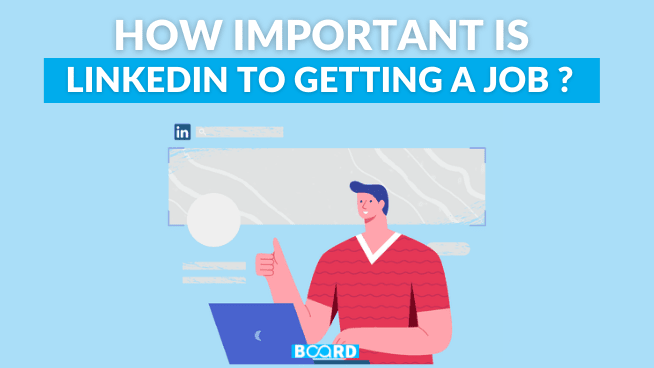LinkedIn, Networking and Professional Branding
Does a Linkedin profile really matter before getting a Job?

If asked should you have a LinkedIn profile, then the answer should be a yes. When known how to use it, LinkedIn can be a real asset for your job search, giving you a multitude of opportunities to explore. Generally, LinkedIn also acts as a validation check of your existence and your professional capabilities. Whenever you apply for a job, mention yourself in a professional conversation, you’re bound to be searched on LinkedIn. That’s mostly the first step any recruiter generally takes on receiving your resume. Having a LinkedIn profile has its own share of benefits and really matters for an effective job search. Let’s see the benefits of LinkedIn in detail.
1. Professional Networking
This is the other main purpose of LinkedIn apart from the usual job-search-related purpose. This platform lets you connect with professionals who are in different roles in different organizations, in various geographies, and having a multitude of experiences. In a way, it will also help because if there’s a job opening as per your choice of interest, then you can always find out some connection from that company and take their help in reaching out to the recruiter. All in all, it’s a goldmine to create connections and keep.
2. Recommendations
This feature is a professional version of the testimonials, the age-old social network, Orkut had. Imagine your professor in college or your boss at your internship had a few golden words to say about you, regarding your skills and capability, then LinkedIn lets you take recommendations from seniors, peers, colleagues, etc. These recommendations will really help your future recruiter form an excellent impression of yours and help you seek an advantage over other job seekers.
3. Power of 2nd and 3rd
Now, you may only know a limited number of people from a particular organization, or an institution on a personal level. You may add all these connections on LinkedIn. The true advantage lies with the second and third-degree connections on LinkedIn. It’s not necessary you know someone at a Zomato, Infosys, or a GE. But, there are high chances that at least one of your first-degree connections is connected to someone there (second-degree connection for you) or connected to someone who knows someone else there (third-degree connection for you). This expands the network and the reach of your contacts and helps you in various ways. You can take advice, you can post about trends, you can conduct polls, you can ask for their help in getting in touch with the recruiters in their companies, etc.
4. Recruiter’s Search Engine
It’s the recruiter’s search engine where the recruiter enters a specific set of search words as per the job openings that need to be filled. Therefore, it is very important your profile has the right kind of skill keywords and the right description of your academic background or any project you have undertaken. The ‘About’ section in your profile lets you write a summary about yourself. Imagine that’s the elevator pitch that you’re giving in a prospective job interview, and take time to frame a good summary that covers all your strong points and interests. The profile summary and other sections are usually crawled by the bots to render search results for the recruiter.
Having a LinkedIn profile will hence boost your chances of landing up an interview and will aid in your job search. It’s always better to have a completed and updated profile along with your resume, for a hundred percent chance of success. Confused about where to start or how to create an expert LinkedIn profile? Head over to our LinkedIn Review Session, and get meaningful insights to create a stellar LinkedIn profile.
